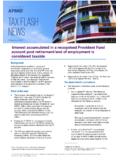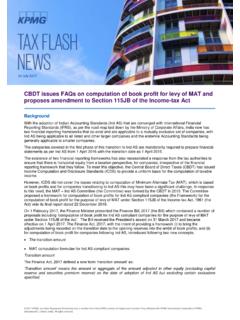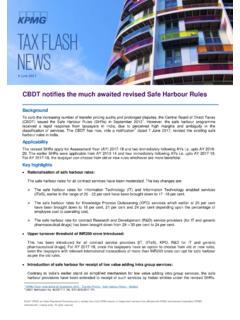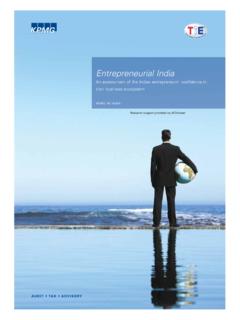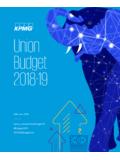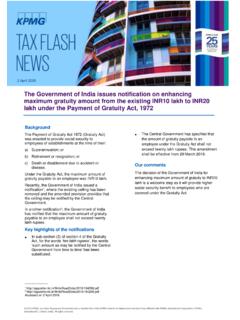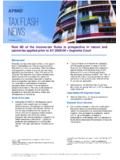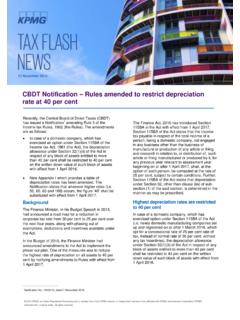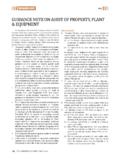Transcription of India’s reservations on 2017 update to the OECD Model Tax ...
1 2017 KPMG, an Indian Registered Partnership and a member firm of the KPMG network of independent member firms affiliated with KPMG International Cooperative ( KPMG International ), a Swiss entity. All rights reserved. india s reservations on 2017 update to the OECD Model Tax Convention and Commentary 30 November 2017 Background Recently, the Organisation for Economic Cooperation and Development (OECD) Council approved the contents of the 2017 update to the OECD Model Tax Convention (the OECD MC)1 . These changes will be incorporated in a revised version of the OECD MC that will be published in the next few months. The 2017 update contains amendments agreed as a part of the Base Erosion and Profit Shifting (BEPS) project. Additionally, certain other amendments were also incorporated on the basis of OECD draft 2017 which was released for public comments on 11 July 2017 .
2 The 2017 update contains position of OECD and non-OECD countries. india has also provided its reservations on the Updated OECD MC. india s reservations are summarised as follows: Permanent Establishment Dependent Agent PE The scope of Dependent Agent PE (DAPE) [Paragraph 5 of PE Article] is expanded to provide that where a person is acting in a state on behalf of an enterprise and in doing so, habitually concludes contracts, or habitually plays the principal role leading to the conclusion of contracts that are routinely concluded without material modification by the enterprise, and these contracts are in the name of the enterprise, or for the transfer of the ownership of, or for the granting of the right to use, property owned by that enterprise or that the enterprise has the right to use, or for the provision of services by that enterprise, that _____ 1 The 2017 update to OECD MC has been approved by OCED Council on 21 November 2017 .
3 Source enterprise shall be deemed to have a permanent establishment in that State in respect of any activities which that person undertakes for the enterprise. Further paragraph 6 of PE Article is amended to provide that aforesaid paragraph shall not apply where the person acting in a State on behalf of an enterprise of the other State carries on business in the first-mentioned State as an independent agent and acts for the enterprise in the ordinary course of that business. Where, however, a person acts exclusively or almost exclusively on behalf of one or more enterprises to which it is closely related, that person shall not be considered to be an independent agent within the meaning of this paragraph with respect to any such enterprise. india reservation india reserves the right not to include the word routinely in paragraph 5 of PE article.
4 Further india reserves the right not to include the words to which it is closely related in paragraph 6 of PE article. india does not agree with the view that in some cases, a person who is acting exclusively for an enterprise, can be considered to be an independent agent. india considers that such a person cannot be considered to be an independent agent. The amended commentary to Article 5 provides that the cases to which paragraph 5 (DAPE) applies must be distinguished from situations where a person concludes contracts 2017 KPMG, an Indian Registered Partnership and a member firm of the KPMG network of independent member firms affiliated with KPMG International Cooperative ( KPMG International ), a Swiss entity. All rights reserved. on its own behalf and, in order to perform the obligations deriving from these contracts, obtains goods or services from other enterprises or arranges for other enterprises to deliver such goods or services.
5 In these cases, the person is not acting on behalf of these other enterprises and the contracts concluded by the person are neither in the name of these enterprises nor for the transfer to third parties of the ownership or use of property that these enterprises own or have the right to use or for the provision of services by these other enterprises. For example, a company acts as a distributor of products in a particular market and, in doing so, sells to customers products that it buys from an enterprise (including an associated enterprise), it is neither acting on behalf of that enterprise nor selling property that is owned by that enterprise since the property that is sold to the customers is owned by the distributor. This would still be the case if that distributor acted as a so-called low-risk distributor (and not, for example, as an agent) but only if the transfer of the title to property sold by that low-risk distributor passed from the enterprise to the distributor and from the distributor to the customer (regardless of how long the distributor would hold title in the product sold) so that the distributor would derive a profit from the sale as opposed to a remuneration in the form, for example, of a commission.
6 india reservation india does not agree with the above interpretation because it considers that distribution of goods owned by an enterprise, by an associated enterprise or a closely connected enterprise, particularly in a case where the risks are not born by such enterprise, such as low risk distributor may give rise to PE of the enterprise, whose goods are being sold. Web site may constitute a PE Commentary on PE Article provides that internet web site, which is a combination of software and electronic data, does not in itself constitute tangible property. It therefore does not have a location that can constitute a place of business as there is no facility such as premises or, in certain instances, machinery or equipment as far as the software and data constituting that web site is concerned. On the other hand, the server on which the web site is stored and through which it is accessible is a piece of equipment having a physical location and such location may thus constitute a fixed place of business of the enterprise that operates that server.
7 india reservation india does not agree with the above interpretation. It is of the view that a website may constitute a PE in certain circumstances where it leads to significant economic presence of an enterprise. Commentary on PE Article provides that the distinction between a web site and the server on which the web site is stored and used is important since the enterprise that operates the server may be different from the enterprise that carries on business through the web site. For example, it is common for the web site through which an enterprise carries on its business to be hosted on the server of an Internet Service Provider (ISP). Although the fees paid to the ISP under such arrangements may be based on the amount of disk space used to store the software and data required by the web site, these contracts typically do not result in the server and its location being at the disposal of the enterprise, even if the enterprise has been able to determine that its web site should be hosted on a particular server at a particular location.
8 In such a case, the enterprise does not even have a physical presence at that location since the web site is not tangible. In these cases, the enterprise cannot be considered to have acquired a place of business by virtue of that hosting arrangement. However, if the enterprise carrying on business through a web site has the server at its own disposal, for example it owns (or leases) and operates the server on which the web site is stored and used, the place where that server is located could constitute a permanent establishment of the enterprise if the other requirements of the Article are met. india reservation india does not agree with the above interpretation. It is of the view that, depending on the facts, an enterprise can be considered to have acquired a place of business through a web site on any equipment, if opening the website on that equipment includes downloading of automated software, such as cookies, which use that equipment to collect data from that equipment, process it in any manner or share it with the enterprise.
9 2017 KPMG, an Indian Registered Partnership and a member firm of the KPMG network of independent member firms affiliated with KPMG International Cooperative ( KPMG International ), a Swiss entity. All rights reserved. Construction PE Commentary on PE article is amended to provide that work that is undertaken on a site after the construction work has been completed pursuant to a guarantee that requires an enterprise to make repairs would normally not be included in the original construction period. Depending on the circumstances, however, any subsequent work (including work done under a guarantee) performed on the site during an extended period of time may need to be taken into account in order to determine whether such work is carried on through a distinct PE india observation india does not agree with the above interpretation because it considers that any work undertaken on a site shortly after the construction work has been completed, including repair works undertaken pursuant to a guarantee, may be taken into account as part of the original construction period, for determining whether a permanent establishment exists.
10 Preparatory or auxiliary activities As per Article 5(4)(d) of OECD MC, the term PE shall not deemed to include the maintenance of a fixed place of business solely for the purpose of purchasing goods or merchandise or of collecting information, for the enterprise. Amended commentary to PE article provides that an enterprise will frequently need to collect information before deciding whether and how to carry on its core business activities in a State. If the enterprise does so without maintaining a fixed place of business in that State, subparagraph d) will obviously be irrelevant. If, however, a fixed place of business is maintained solely for that purpose, subparagraph d) will be relevant and it will be necessary to determine whether the collection of information goes beyond the preparatory or auxiliary threshold. For example, an investment fund sets up an office in a State solely to collect information on possible investment opportunities in that State, the collecting of information through that office will be a preparatory activity.
